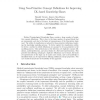Free Online Productivity Tools
i2Speak
i2Symbol
i2OCR
iTex2Img
iWeb2Print
iWeb2Shot
i2Type
iPdf2Split
iPdf2Merge
i2Bopomofo
i2Arabic
i2Style
i2Image
i2PDF
iLatex2Rtf
Sci2ools
112
click to vote
DLOG
2004
2004
Using Non-Primitive Concept Definitions for Improving DL-based Knowledge Bases
Medical Terminological Knowledge Bases contain a large number of primitive concept definitions. This is due to the large number of natural kinds that are represented, and due to the limits of expressiveness of the Description Logic used. The utility of classification is reduced by these primitive definitions, hindering the knowledge modeling process. To better exploit the classification utility, we devise a method in which definitions are assumed to be non-primitive in the modeling process. This method aims at the detection of: duplicate concept definitions, underspecification, and actual limits of a DL-based representation. This provides the following advantages: duplicate definitions can be found, the limits of expressiveness of the logic can be made more clearly, and tacit knowledge is identified which can be expressed by defining additional concept properties. Two case studies demonstrate the feasibility of this approach.
Automated Reasoning | Concept Definitions | DLOG 2004 | Large Number | Primitive Concept Definitions |
| Added | 30 Oct 2010 |
| Updated | 30 Oct 2010 |
| Type | Conference |
| Year | 2004 |
| Where | DLOG |
| Authors | Ronald Cornet, Ameen Abu-Hanna |
Comments (0)

